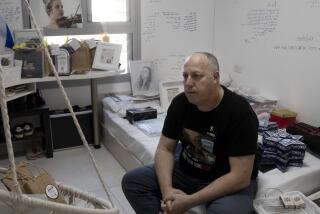Holidays Compel Interfaith Pairs to Find Solutions
Each December, Janice and Ron Ruef of Newbury Park flick on the white lights that adorn their silk ficus tree.
Janice is Jewish, but out of respect for Ron, she calls the plant the Christmas tree.
And Ron, who was raised as a Christian, refers to the ficus as the Hanukkah bush.
Their 6-year-old, Kevin, who is being raised as a Jew, just calls it “that tree in the corner where the presents go.”
Like thousands of other interfaith couples in America, the Ruefs have a difficult time during the winter holiday season. This year, the first night of Hanukkah falls on Dec. 23, and Christmas Eve is the next day.
Often referred to by Jewish-Christian couples as the “December dilemma,” much of the debate revolves around the Christmas tree.
“It’s the central focus of the conflict,” said Sarene Wallace, who works at the JFC-Temple Ner Ami in Camarillo and whose husband was raised as a Methodist. “I don’t know why, but having a Christmas tree would really freak me out. I know people argue that it’s not a symbol of Christ, but the overtones are sure there.”
Her advice to couples is this: Have one religion in the home for the children and discuss the Christmas tree thing before having kids.
Rabbi Shimon Paskow of Temple Etz Chaim in Thousand Oaks explained that even though many Christians might say the tree isn’t a religious symbol--that it signifies family and love--the tree is steeped in traditional Catholic lore. And when Catholics celebrate Mass on Christmas, they are sacrificing Jesus for the world’s sins, Paskow said. Jews just can’t accept that, he said.
Christians might find it easier to take menorahs into their households, he said, as the candelabra is merely a symbol of light.
Paskow said that Jews on the whole tend to care more about keeping their faith intact than Christians because they are a small minority trying not to be swallowed by the majority.
Ron Ruef said he understands, and that’s why he and Janice have decided to raise Kevin and baby Bryan as Jews.
Over the years, Ron has taken the crucifix from around his neck, stopped going to church and learned to settle for the family’s imitation ficus tree.
“Originally, I thought the boys could have the best of both worlds,” Ron said. But after listening to the advice of a woman in an interfaith class he took a while back, he decided that “it was best if children have just one religion.”
So now, Ron lights the menorah with his family and sings the Jewish prayers over the candles marking the eight days of Hanukkah.
But still, it is not Ron’s favorite time of year.
“December is hard,” he said. “There are family members that don’t honor Janice’s holiday. I’d rather it were Thanksgiving. Because then you get together with your family and religion isn’t even an issue.”
And Janice said it’s difficult to deal with the heaps of presents for the two celebrations--some wrapped in red and green for Ron’s family, and some with dreidels on them for her relatives.
She admitted that although she doesn’t consider herself an observant Jew, the tension of Christmas makes her want to cling more dearly to her faith.
*
The Rev. John Martin of the Church of the Foothills in Ventura said he wishes that the December season wasn’t so full of exclusion.
He said he knew of a family that celebrated both Hanukkah and Christmas and “the kids weren’t [left] out of anything.”
“I see no problem with having a menorah and a Christmas tree,” Martin said, adding that people should spend more time on what kind of human beings they are and less time on their religious identity.
Religion was never much of a problem for Sarah and Frank Karamus of Simi Valley, even though she is a Jew and he was raised with Greek Orthodox and Catholic traditions.
That is, until the kids came.
“All of a sudden, I didn’t want to be sending mixed messages,” Sarah Karamus said.
She told Frank there would be no more Christmas tree.
And for the first few years they “had words,” she said, admitting that her husband still misses the tree.
But now it’s OK, she said, and all three of their children are happy celebrating Hanukkah in the home and participating in Christmas parties at their paternal grandmother’s home.
What seems to upset her the most right now, however, is the amount of gift shopping she needs to do before both holidays.
“I don’t like having to keep up with the Joneses with all the gift giving,” she said. “Both Hanukkah and Christmas have gotten commercialized.”
More to Read
Sign up for Essential California
The most important California stories and recommendations in your inbox every morning.
You may occasionally receive promotional content from the Los Angeles Times.










